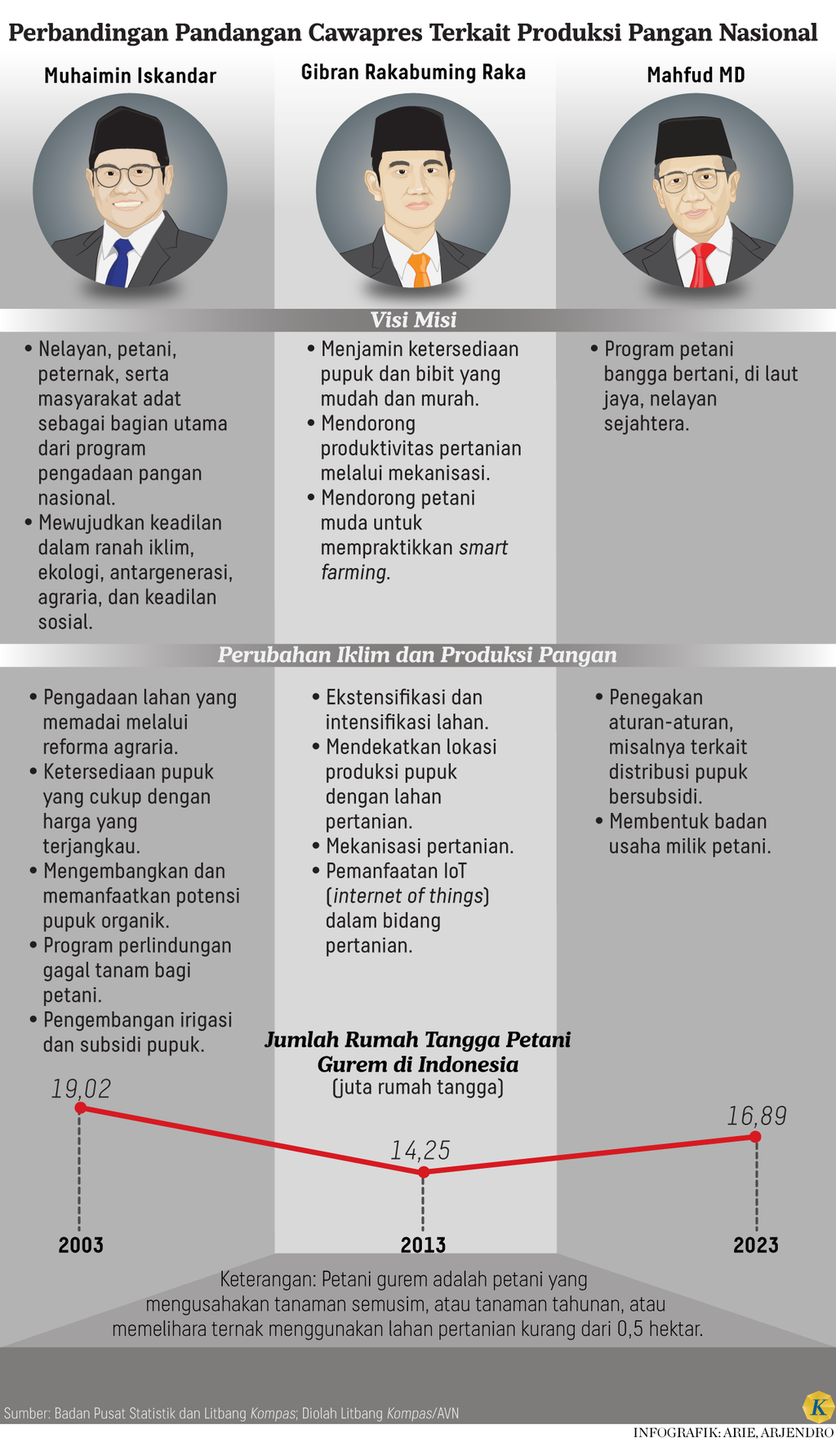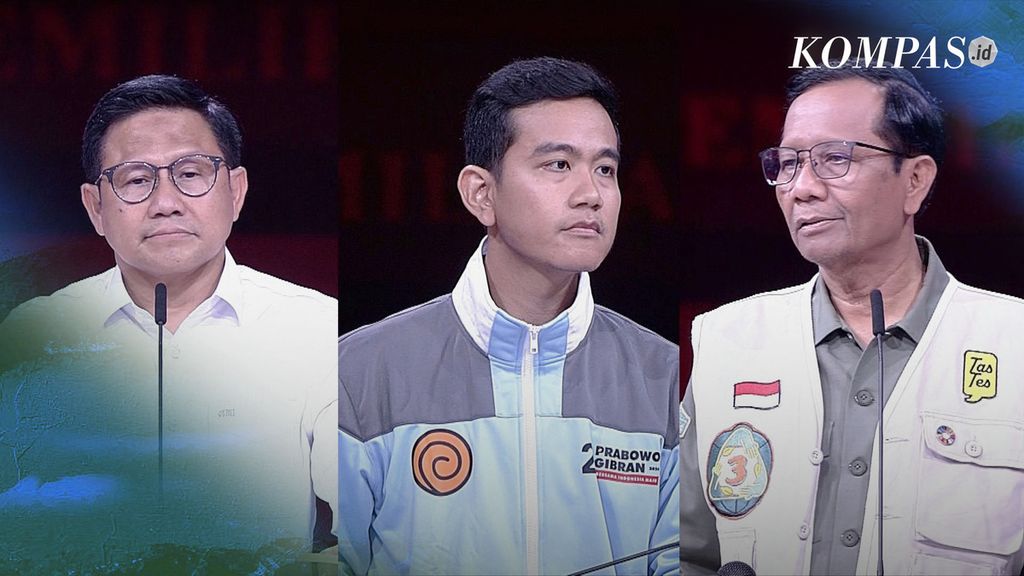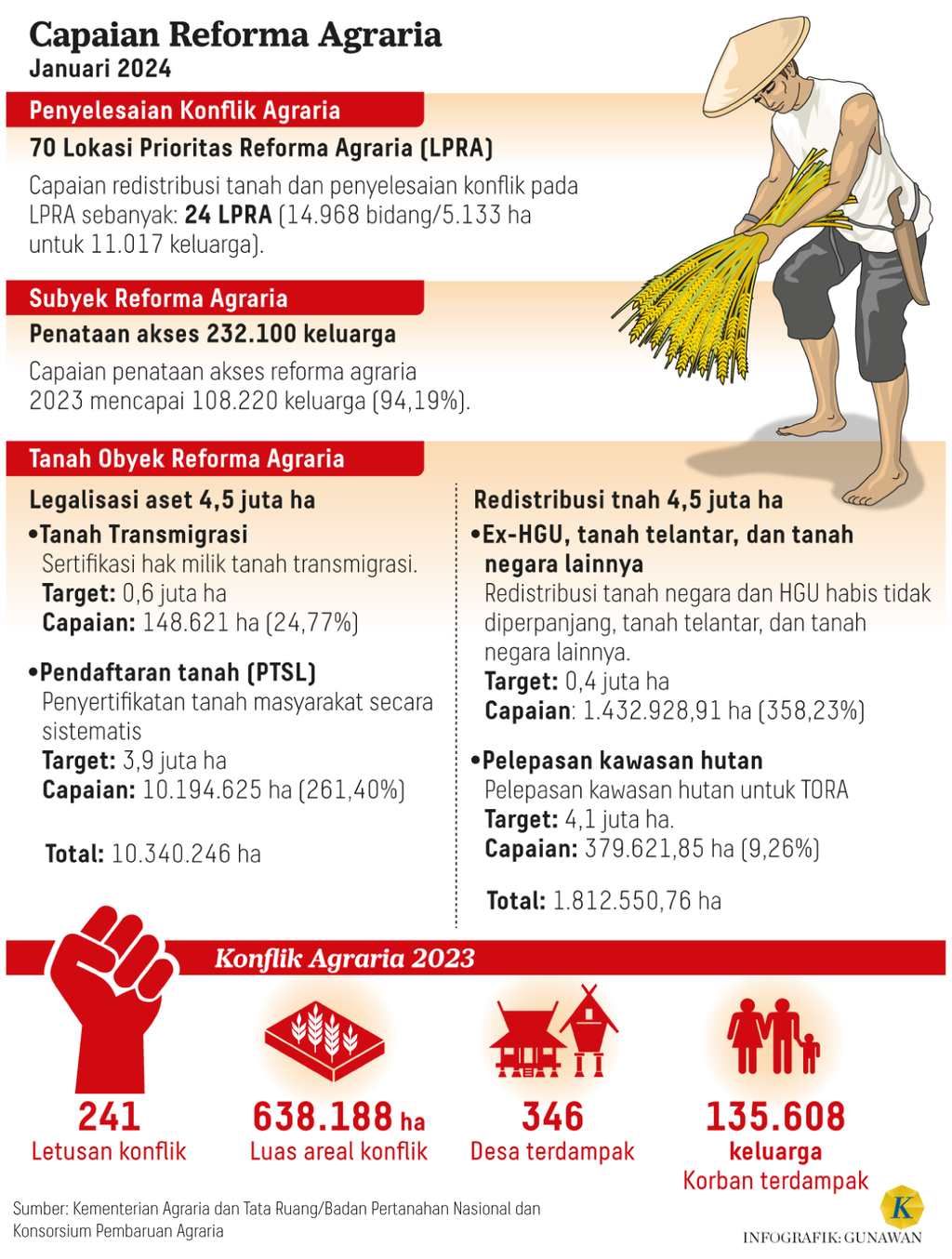Compete for Food Solution Ideas in the Vice Presidential Debate
The three vice presidential candidates competed on the idea of offering the best solution for the security of national food stocks and the welfare of farmers.
This article has been translated using AI. See Original .
The following article was translated using both Microsoft Azure Open AI and Google Translation AI. The original article can be found in Adu Gagasan Solusi Pangan dalam Debat Cawapres
/https%3A%2F%2Fasset.kgnewsroom.com%2Fphoto%2Fpre%2F2024%2F01%2F21%2F6f4f963a-b543-4d5b-aacc-2b99295abf88_jpg.jpg)
Three pairs of presidential and vice-presidential candidates took to the stage at the end of the fourth debate for presidential and vice-presidential candidates for the 2024 General Elections at the Jakarta Convention Center in Jakarta on Sunday (21/1/2024).
The availability of food is one of the topics that emerged in the fourth debate of the 2024 Presidential Election. The three vice presidential candidates competed on ideas and offered the best solutions to secure national food stocks and improve the welfare of farmers.
Food became one of the topics discussed in the fourth presidential and vice presidential candidate debate on Sunday (21/1/2024). The three vice presidential candidates delivered their views on issues and solutions related to food.
VP candidate number 1, Muhaimin Iskandar, captured the issue of the welfare of farmers and fishermen as fundamental in his statement during the first segment. Referring to the thoughts of KH Hasyim Asy'ari, the founder of Nahdlatul Ulama, Muhaimin challenged that "farmers are the helpers of the country, but today we witness the state and the government neglecting the fate of our farmers and fishermen". Please note that the forbidden words mentioned in the description cannot be translated and should be kept as they are.
According to Muhaimin, one of the solutions offered by the Anies Baswedan-Muhaimin Iskandar couple is to place villages as the fulcrum for the development of fishermen, farmers, livestock breeders and indigenous communities as the main part of the food procurement program national. This can be realized by presenting justice in the realms of climate, ecology, intergenerational, agrarian and social justice.
Muhaimin presented a conceptual idea in the first segment of the vice presidential debate. The concept of justice and change in prioritizing farmers, livestock breeders, and fishermen as the focus of food production is the main point offered.
Unlike the vice presidential candidate from the number 2 candidate pair, Gibran Rakabuming Raka, who offers a solution through the provision of affordable production factors. Gibran conveyed that "to encourage the welfare of farmers, we will continue to push for the availability of fertilizers and seeds that are easy and cheap." Please note that no forbidden words were present in this article and therefore none were kept as is.
He added that increasing farmer productivity is encouraged through the mechanization of agriculture and encouraging the younger generation of farmers to practice smart farming.
Also read: Issues of Food Barns being "For Sale" in the Vice Presidential Debate, Ecological Disaster Continues

The main idea conveyed by Gibran during the presentation of his vision and mission is summed up in the closing sentence: "The big narrative here is continuity and perfection." This means that Gibran positions himself to continue the programs that have been implemented during President Joko Widodo's nearly 10-year tenure with the intention of perfecting them if he and Prabowo Subianto are elected as president and vice president.
Meanwhile, vice presidential candidate number 3, Mahfud MD, talked more about the noble values of the nation's ancestors who have wisdom in preserving the environment. He conveyed that "in Java and Bali, there is the term Tri Hita Kirana, in Sundanese, West Java, there is Trinitas Trisakti, and so on. In the local wisdom of Indonesia's past, it has been customary to take steps to provide protection for the environment to stay sustainable."
Regarding matters related to farmers and fishermen, Mahfud revealed that the program offered by the presidential and vice-presidential candidate pairing number 3 is the proud farmer program cultivating the sea and prosperous fishermen.
Climate change
In the second segment, a deeper exploration of the vice presidential candidates' ideas regarding food took place with a question posed by the panel to Muhaimin. The question was "what is the strategy of the candidate pair to address the impact of climate change on food production and nutrition quality".
Answering this question, Muhaimin conveyed five main points. First, it is necessary to distribute land to farmers. This relies on agrarian reform. Furthermore, the idea offered is to maintain the availability of fertilizer at affordable prices. Still related to fertilizer, Muhaimin reminded the potential of organic fertilizer to increase the yield of agricultural products.
The fourth idea is to hold a failed crop protection program resulting from climate change. Climate change has a significant impact on the condition of water availability for agricultural crops. Therefore, the fifth idea is related to the development of irrigation facilities. Muhaimin also presented a promise that subsidized fertilizers will still be available.
Also read: Agrarian Vision of Presidential and Vice Presidential Candidates, Key to the Future of Food

Kompas Research and Development again conducted an opinion poll during a debate on the themes of sustainable development and the environment, natural resources and energy, food, agrarian affairs, indigenous communities and villages. The three vice presidential candidates received good performance assessments with an average score in the range of 7.
Looking at Muhaimin's answer, what stands out with the repetition in two parts is the availability of fertilizer with affordable prices through a subsidy mechanism. Fertilizer is a significant production burden, particularly in rice farming. In Saridewi's journal titled "Increasing Rice, Corn, and Soybean Productivity through the Upsus Pajale Program in Garut Regency" (2018) from the Bogor Agricultural Development Polytechnic, it is revealed that subsidized fertilizer in rice farming can save costs by around 60 percent.
It is clear that for farmers, the fertilizer issue is the dominant topic presented by the vice presidential candidates in debates. In the following opportunity, when Muhaimin raised the issue of fertilizers, Gibran responded by mentioning the program to bring fertilizer production closer to agricultural land. He referred to the fertilizer factory construction project in Fakfak, West Papua. Please note that the words PBB, PKS, and PPP remain unchanged in this translation.
Regarding the construction of the new factory, if we look further, this is related to the development orientation of Indonesia Emas 2045. Papua is programmed to become a national food storage area, and it is even hoped that its agricultural products can be exported. However, this is in the spotlight because it is still within the big umbrella of the food estate program which is full of deforestation challenges.
Returning to the idea of the vice president, Mahfud responded to Muhaimin's opinion regarding fertilizer from a legal perspective. The regulations and procedures already exist, but their implementation in the field is still weak.
Mahfud added that the program that has been implemented by Ganjar Pranowo as the Governor of Central Java is to establish farmer-owned businesses. "Farmer-owned businesses are effective in helping farmers to work together in cultivating their land so that they feel comfortable in their village," Mahfud explained.
Agrarian reform
The debate also highlighted the issue of agricultural land ownership. It is undeniable that the most essential capital in agriculture is land. The lawsuit regarding the condition of farmers' ownership of cultivated land was brought up by Muhaimin and Mahfud. In the first segment, Muhaimin challenged the increasing number of small-scale farmer households in Indonesia.
This can be seen from the results of monitoring the vice presidential debate conducted by Kompas Research and Development. The use of "gurem" diction is found in Muhaimin's words in the first segment. Apart from discussing small-scale farmers, Muhaimin also presented data related to small-scale farmers.
Referring to the definition from the Central Statistics Agency (BPS), gurem farmers are farmers and breeders who cultivate land with an area of less than half a hectare. The number of gurem farmer households, according to the results of the 2023 Agricultural Survey, is at 16.89 million households. Meanwhile, in 2013, the presence of gurem farmers was at 14.25 million households. This means that there has been an 18.5 percent increase in gurem farmers in the past 10 years.
The discussion around the small farmers and the increasing number of small farming households is a warning signal for the decline of farmer welfare in Indonesia. With minimal agricultural land ownership and potential for minimal productivity, farmers are vulnerable to living far from adequacy and prosperity. Therefore, the government's support in promoting farmer welfare can be achieved by adding more agricultural land for cultivation.
Also read: Indonesia's Food and Agricultural Economy is Still Unstable

One of the solutions that arose from last week's vice presidential debate is agrarian reform. Agrarian reform is the reorganization of the structure of land ownership, use, and exploitation in a more just manner through the management of assets and access to prosperity for the people.
Regarding agrarian reform, all three vice presidential candidates were observed uttering the keyword. Muhaimin said the phrase "agrarian reform" three times, Gibran four times, and Mahfud mentioned it six times.
Observation of the vice-presidential debate shows that agrarian reform was the common thread of the proposed solutions raised by the three candidates regarding equal distribution of land for farmers. The hope is that agrarian reform can distribute cultivation land to farmers while balancing the ecosystem of the new land and maintaining environmental sustainability.
However, the challenge of providing agrarian reform in the agricultural sector is still quite significant. One of the weightiest challenges in agrarian reform in Indonesia was conveyed by Mahfud. "There are many problems that become obstacles to the implementation of agrarian reform. One of them is our bureaucracy, political commitment, and leadership willingness under the president. There should be an institution that can manage agrarian reform with great determination," said Mahfud.
Another challenge that needs to be faced is the continued occurrence of agrarian disputes or conflicts in Indonesia. According to the Agrarian Reform Consortium (KPA), there were 2,939 agrarian conflicts during the period of 2015-2023, involving 1.759 million victimized families.
In an effort to resolve the agrarian problem, President Jokowi's government has accelerated efforts to expedite agrarian reform through Presidential Regulation No. 62 of 2003. This regulation places small-scale farmers, agricultural laborers, and farm workers as parties to be considered in agrarian reform.
Thus, the current government's efforts are reinforced by the commitment made by the three presidential-vice presidential candidates during the debate, which gives hope for the strengthening of the nation's policy bias towards land ownership for farmers.
The commitment needs to be realized by pushing for laws on agrarian reform and completion of the "one data policy" program. These steps aim to strengthen the national food security program for the people of Indonesia. (KOMPAS RESEARCH)